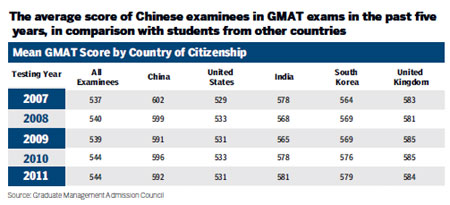Chinese students' interest in foreign business schools has risen sharply in the past five years, especially among women, new data show.
The Graduate Management Admission Council, a nonprofit educational organization of leading graduate business schools and owner of the Graduate Management Admission Test, said Chinese GMAT takers almost tripled in the past five years, from 48,664 to 126,090.
The test is the only standardized exam for graduate business and management programs worldwide.
|
 |
Growth has been driven by female students and those younger than 25, who are largely interested in specialized master's programs outside China.
"The high percentage of females taking the GMAT is unique to China," said Julia Herries, Asia-Pacific regional director for the GMAC.
"Most Chinese women taking the exam are considering a specialized master's degree, such as in accounting and finance.
"Given the rapid economic development in China, there is significant demand for these skills, and many young women view a career in finance and accounting as providing a stable future," she said.
In the 2011 testing period, which ended in June, 64 percent of Chinese examinees were female, compared with 57 percent globally and 61 percent in US.
A 24-year-old Beijing examinee surnamed Fang told China Daily that she took the exam for a bright future in France.
Fang learned French in college and stayed in France for a year on an exchange program. Then she returned to China and found a job in a State-owned company.
"Although the work is stable and the pay is good, I still think I, as a women, should focus more on my career when I am still young, because it would be harder for me to do so after getting married," Fang said.
Fang will take the exam in July, and send the scores to business schools in France.
"We are committed to supporting the growing number of Chinese students pursuing graduate management education every year, whether they desire to pursue this at home in China or overseas, by providing them with the information they need to choose their course of study," Herries said.
"The significance of the Asian impact on management education is real," said Dave Wilson, president and chief executive of the GMAC.
"The flows of graduate management students to, from and within the region have positive benefits for Asian firms as well as multinational companies that operate there."
Programs in Asia saw a 63 percent increase in the number of GMAT scores received from test takers over the past five years.
Some of the top study destinations for Asian citizens are India, Britain, Singapore and Canada.
In June, a new test will replace the old GMAT, which some education analysts said would make the exam easier for Chinese students.
However, Herries said the goal in developing the next-generation GMAT is not to make the test harder or easier, but to make it better.
"Today's businesses and organizations demand managers who can make sound decisions, discern patterns, and combine verbal and quantitative reasoning to solve problems," she said.
"The skills being tested by the new 'integrated reasoning' section were identified in a survey of 740 management faculties worldwide as important for today's incoming students."
The quantitative and verbal sections in the GMAT will remain the same. The writing assessment will be streamlined from two 30-minute essays to one argument-analysis essay.
"Chinese students, who perform well in the GMAT, are likely to continue to perform well with the addition of the 'integrated reasoning' section," Herries said.
Contact the writer at chengyingqi@chinadaily.com.cn
